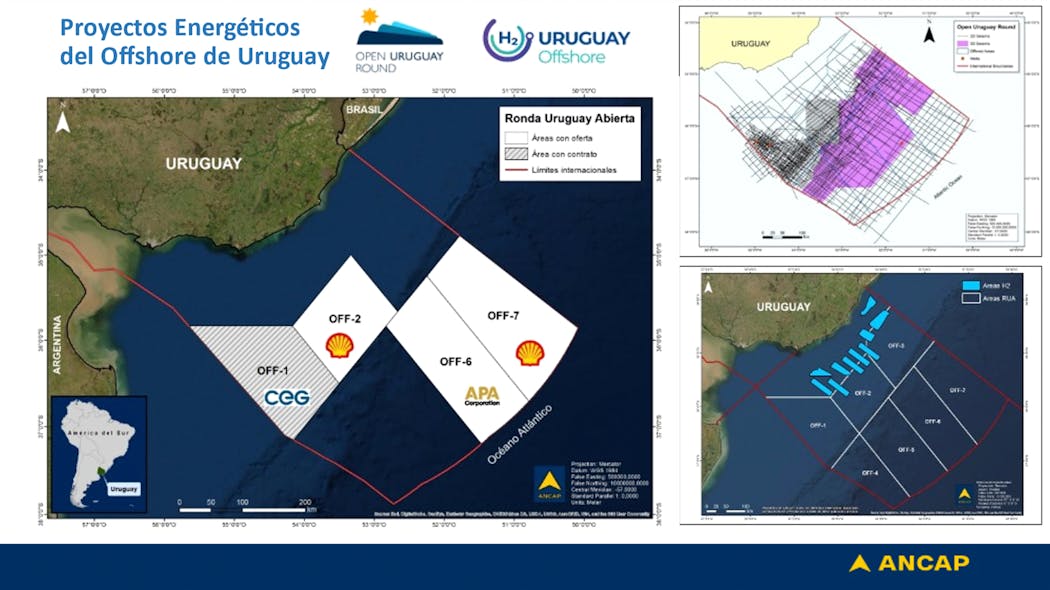Black Gold In Uruguay? Analyzing The Viability Of Offshore Drilling

Table of Contents
Geological Potential and Exploration Activity
The geological formations off the Uruguayan coast hold intriguing possibilities for hydrocarbon reserves. Several sedimentary basins, formed over millions of years, offer promising targets for offshore drilling. These basins, characterized by their unique stratigraphy and depth, are attracting the attention of international energy companies. The exploration activity in these areas is still relatively nascent, but initial results suggest a potential for significant discoveries.
- Key sedimentary basins with potential: The Punta del Este Basin and the Pelotas Basin are among the most promising areas for exploration. These basins share geological similarities with other productive regions in South America, fueling optimism about their hydrocarbon potential.
- Significant discoveries or promising exploration results: While no major commercial discoveries have been announced to date, seismic surveys and other preliminary exploration efforts have revealed promising subsurface structures that warrant further investigation. These early findings have spurred increased interest in offshore drilling Uruguay.
- Exploration techniques: Advanced technologies such as 3D seismic surveys are being employed to map the subsurface structure and identify potential hydrocarbon traps. This detailed data analysis is crucial for guiding future drilling operations and minimizing exploration risks.
Economic Implications and Investment
Successful offshore drilling in Uruguay could significantly boost the nation's economy. The potential for job creation, both directly in the energy sector and indirectly in supporting industries, is substantial. Increased government revenue through taxation and licensing fees would also provide substantial funds for public services and infrastructure development. However, it's crucial to understand the potential downsides.
- Potential GDP impact: Estimates suggest that successful offshore oil and gas production could add several percentage points to Uruguay's annual GDP growth, significantly improving the nation's economic outlook.
- Foreign investment inflow: Offshore drilling projects would likely attract substantial foreign direct investment (FDI), bringing in much-needed capital and expertise. This injection of capital can further stimulate economic growth.
- Revenue sharing agreements: Negotiating fair and transparent revenue-sharing agreements with international energy companies is crucial to maximizing the economic benefits for Uruguay. Securing favorable terms is vital to the success of offshore drilling Uruguay.
- Economic instability if projects fail: Conversely, failed projects could result in significant financial losses and potentially destabilize the economy. Careful risk assessment and mitigation strategies are essential.
Environmental Concerns and Regulatory Framework
Offshore drilling carries inherent environmental risks. Oil spills, though rare, can have devastating consequences for marine ecosystems, impacting biodiversity and potentially harming coastal communities. Habitat destruction from drilling activities and noise pollution from seismic surveys are additional concerns. Uruguay's regulatory framework must effectively mitigate these risks.
- Potential impacts on marine ecosystems: Oil spills can cause widespread damage to sensitive marine habitats, such as coral reefs and breeding grounds for various species. The long-term ecological consequences can be severe.
- Effectiveness of environmental impact assessments: Rigorous environmental impact assessments (EIAs) are vital to identify and mitigate potential environmental damage. The thoroughness and independence of these assessments will determine the level of environmental protection.
- Relevant environmental regulations and permits: Uruguay needs robust environmental regulations and a transparent permitting process to ensure compliance with international best practices and protect its natural resources. Strict enforcement is critical.
- Public opinion and potential protests: Public perception and environmental activism play a crucial role. Open communication, transparent decision-making, and community engagement are vital to building public trust and minimizing potential conflicts.
Technological Challenges and Solutions
Offshore drilling in Uruguay presents several technological challenges. The depth of the water column, the seafloor conditions, and potentially challenging weather patterns could complicate operations. However, technological advancements are mitigating these risks.
- Specific technological challenges: Deepwater drilling, seabed instability, and harsh weather conditions can increase operational costs and risks associated with offshore drilling Uruguay.
- Advancements in drilling technology and safety measures: New drilling technologies, advanced safety systems, and improved spill response capabilities have greatly reduced the risks associated with offshore drilling.
- Technology in environmental monitoring and mitigation: Remote sensing, underwater drones, and advanced monitoring technologies provide real-time data for better environmental management and quicker response times in case of incidents.
Conclusion
The viability of offshore drilling in Uruguay is a complex issue, balancing significant economic potential with environmental concerns. While the prospect of substantial economic growth is enticing, a responsible approach prioritizing environmental protection is paramount. Successful offshore drilling hinges on robust regulatory frameworks, transparent decision-making, and the adoption of cutting-edge technologies to mitigate environmental risks.
Further research and transparent public discourse are vital to responsibly assessing the viability of offshore drilling in Uruguay. Informed decision-making is crucial to ensuring a sustainable future for both the nation's economy and its environment. Continue exploring the potential of Uruguay's offshore resources and the best practices for offshore drilling globally to ensure a responsible path forward.

Featured Posts
-
 New Calvin Klein Campaign Lily Collins Stunning Photos
May 11, 2025
New Calvin Klein Campaign Lily Collins Stunning Photos
May 11, 2025 -
 Palou Edges Out Dixon In Thermal Club Warm Up Session
May 11, 2025
Palou Edges Out Dixon In Thermal Club Warm Up Session
May 11, 2025 -
 Mma Torchs Top 3 Fights 5 10 And 25 Minute Showdowns
May 11, 2025
Mma Torchs Top 3 Fights 5 10 And 25 Minute Showdowns
May 11, 2025 -
 Wbc Final Eliminator Cissokho Takes On Kavaliauskas
May 11, 2025
Wbc Final Eliminator Cissokho Takes On Kavaliauskas
May 11, 2025 -
 Lily Collins Calvin Klein Photos A Look At The New Campaign 5133600
May 11, 2025
Lily Collins Calvin Klein Photos A Look At The New Campaign 5133600
May 11, 2025
